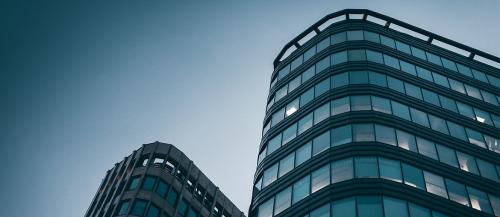Over the past few years, we have noticed that the UK has experienced a large shift in working patterns. The COVID-19 pandemic has fast-tracked the adoption of remote work, and now it is ever-present in today’s society. This sudden and prevalent change has led to a lasting impact on office construction and design.
With the demand for large office spaces decreasing, businesses have been forced to reconsider the suitability of their current work environments, leading to many of them desiring smaller spaces to compensate for the decreased physical presence of their workforces.
The Rise of Remote and Hybrid Work
Remote and hybrid working were already gaining momentum before 2020, but the global pandemic greatly sped up this surge in popularity. Lockdowns and health concerns led businesses to embrace remote work to keep their operations running. Once this strategy was employed, many workers and companies then began to acknowledge the benefits of remote and hybrid working, such as an improved work-life balance and reduced commuting times, thus making it a welcome addition to people’s work lives.
Contributing Factors to the Growth in Remote Working
There are several factors that are responsible for the rise of remote work. Firstly, technological advancements, such as high-speed internet, cloud computing, and communication tools like Zoom and Microsoft Teams, have made remote work easier and more achievable than ever before. The large range of technology available makes it possible for employees to perform most tasks from the comfort of their own homes, negating the need to physically be in the office.
Another factor is the change in employee expectations. Today’s workforce prioritises flexibility, with many employees seeking a better balance between their personal and professional lives. Companies have recognised that offering remote work can attract and retain talent, especially in competitive industries. In fact, this can be highlighted by the fact that over half of UK employers offered remote work in 2023 alone.
Lastly, environmental considerations also play a part in promoting this change. With fewer people commuting daily, remote work can reduce carbon footprints, aligning with the UK’s growing focus on sustainability.
The Changing Demand for Office Spaces
With remote and hybrid work becoming more frequent, the demand for traditional office spaces has shifted. Large headquarters are no longer seen as essential. Instead, there is a growing desire for smaller and more adaptable spaces that can serve several different purposes. These offices are designed to cater to hybrid workers, who might only come into the office a few days a week.
The Shift Towards Smaller and More Flexible Offices
The major trend in office construction is the shift towards smaller, more flexible buildings in order to align with businesses’ aims to downsize. An example of this involves the Sharp Project in Manchester. Originally a warehouse owned by Sharp Electronics, this building has now been renovated into a blend of small office spaces and other facilities, giving businesses the opportunity to fulfil their new needs.
With office spaces being constructed at a smaller scale, it is also inevitable that some of them will be a part of mixed-use developments. This is also the case with the Sharp Project, with these smaller office spaces neighbouring recording studios and sound stages.
Challenges Facing Office Construction in the UK
The shift towards flexible, smaller office spaces brings its own set of challenges, both for past and current office construction projects. Many existing office buildings were constructed with traditional work models in mind, making them less adaptable to current needs. Retrofitting these buildings to meet the requirements of today’s workforce can be costly and time-consuming.
There is also the challenge of ensuring that new office spaces remain attractive to both companies and their employees. Designers and builders must strike a balance between creating a functional workspace and maintaining a pleasant, engaging environment that encourages people to return to the office.
Final Thoughts
The rise of remote and hybrid work has had a significant impact on office construction in the UK. As companies shift away from traditional, large-scale offices, the demand for smaller, more flexible buildings has increased. Office construction projects are now adapting to these new trends, ensuring that businesses can meet the changing needs of their workforce.
BS Fixings: Committed to Quality
The demand for UK office spaces may be changing, but our commitment to providing you with high-quality products is not. We take pride in offering you a large range of building and fixing materials to help you kickstart and secure your next project. Discover the complete range today, or contact us by calling 03330 117818 if you have any questions.






